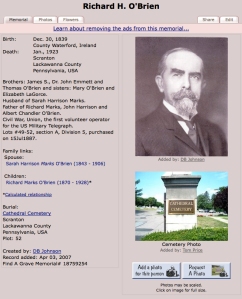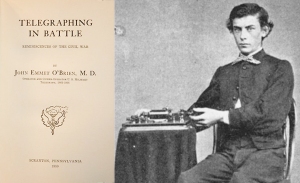It occurred to me that Richard may have been notable enough to warrant an obituary in a major newspaper so I began checking periodicals. While searching for information about his death I came across the website findagrave.com and was pleasantly surprised to find an entry for him.
It wasn’t an obituary, but Richard’s entry contained some good information about his family, birth, death and Civil War service. It also featured a picture of Richard in his later years. I thought to make note of the grave and perhaps visit it someday.
I was more curious about how this entry came to be and who put it together. Someone out there knows more than I do about my Great Great Grandfather and I wanted to connect with that person. The page indicated that it was created by DB Johnson. The name was hot and when I clicked on it another window opened in my email to directly send DB a message. I included my name and contact information as well as a little of the family history I knew, and hit send. Maybe I would get a reply, maybe I wouldn’t. Either way I had some more information to go on.
